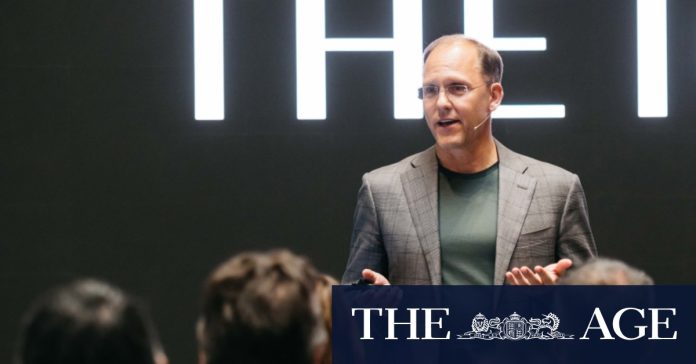[ad_1]
Another one is “hybrid fulfilment”, which folds multiple fulfilment options (from The Iconic or the supplier itself) that minimises the appearance that an item is out of stock. A third method that Calmes says is proving popular is “Fulfilled by The Iconic”, a blend of drop-shipping and wholesaling in which products are warehoused and couriered by The Iconic while allowing the vendor to retain control over pricing.
Becoming more flexible in how it works with brands is both The Iconic’s biggest opportunity and its greatest challenge.
“Changing the norms, in general, is the most difficult thing,” Calmes said. “The real challenge is making sure that the market sees us the way we want to be seen: [as] a differentiator player, e-commerce at scale, and it’s very focused on fashion. We bring something to the market that nobody else has.”

The Iconic wants to cement itself as a fashion destination amid higher competition and at a tough time for retail.
The Iconic is defending its territory as the leading online retailer amid a very tough trading environment. Cost of living pressures have made shoppers more discerning and more reluctant to open their wallets. As insolvencies hit record highs month after month, fashion labels are collapsing.
Consumers are trading down for more affordable options. People are adding to their wish lists but not necessarily to their carts as they wait for promotions, forcing The Iconic to price-match more often.
“That’s the hygienics of business. You can’t be more expensive than your competitors,” said Calmes. “If they were to buy two dresses, they’re gonna buy one. You’re seeing that. It’s not easy times.”
Cost of living pressures have also acted as a tailwind for ultra-cheap clothing giants Shein and Temu, which Calmes described as both proof people want to shop on apps and as a threat to the overall retail industry. Return rates are slightly higher – half a percentage point – than what they used to be: some customers have returned items because they couldn’t afford it.
Amid all of this, Calmes says while shopping frequency is down, basket sizes have grown, and the new platform model is working. Brands that previously drop-shipped had migrated to the fulfilled-by model and had sales improved by 25 per cent, he said. This fulfilment model has also attracted the likes of Spanish brands Bershka and Pull & Bear, which did not have a foothold in the Australian market until recently.
“That starts the flywheel going, and I think then it’ll turn into FOMO.”

Online fashion retailer The Iconic chief executive Jere Calmes.
As The Iconic is an online pure play, Calmes is acutely aware of the importance of staying ahead of the competition. Bricks-and-mortar retailers have understood the importance of having a strong ecommerce offering: department stores David Jones and Myer are pouring more investment into this space.
The Iconic has been incorporating artificial intelligence to improve search, chatbots and personalisation and it is eager to flaunt these credentials. “What I think is not known is how amazing of a tech company we are.”
Charting a growth story
In its 13 years of operation, The Iconic has never notched a profit on the books. In 2022, it reported losses of more than $11 million, more than double the year before. Calmes signalled this trajectory is shifting now that the business has moved to a platform model, lifting the volume of service fees and deliveries.
“For the last 12 years, The Iconic’s been very focused on growth because of the opportunity of growing in the online world. We’re still going to grow, but our focus turns a bit more towards ‘what’s the rational type of growth, and how do we grow together with our partners’.”
“At the operational level, we’ve broken even, but it was a decision not to be profitable as a decision actually to go after growth.”
Loading
The Iconic made 116 roles redundant last year. This masthead has previously uncovered issues that plagued the business, including a poor culture where working conditions and pay discrepancies were not paid attention to, which predate Calmes’ appointment.
The chief executive, who said he walked the floor of The Iconic’s fulfilment centres once a week, said culture was “the most important thing in a company” and extolled the capabilities of his leadership team.
“I’m ultimately responsible,” he said. “But my philosophy in terms of management is the management team runs a company … we’ve brought in some incredible talent from the market. We’ve brought some amazing talent from within up.”
The Iconic has also been caught with payroll errors due to which staff had been underpaid around $1.2 million between 2019 and 2023. While Australia is renowned for having high wages and robust protections for workers, the complexity and layers of regulation around pay has been a common gripe for small and big businesses alike (a concern not shared by the Fair Work Ombudsman).
“As an external person coming in, yes, it pops right up to the top as something you notice,” said the retail executive.
It’s important for government to consult with industry bodies and businesses when designing legislation, he said. “I think you could say the pendulum has swung a bit too far.”
The Business Briefing newsletter delivers major stories, exclusive coverage and expert opinion. Sign up to get it every weekday morning.
[ad_2]
Source link


